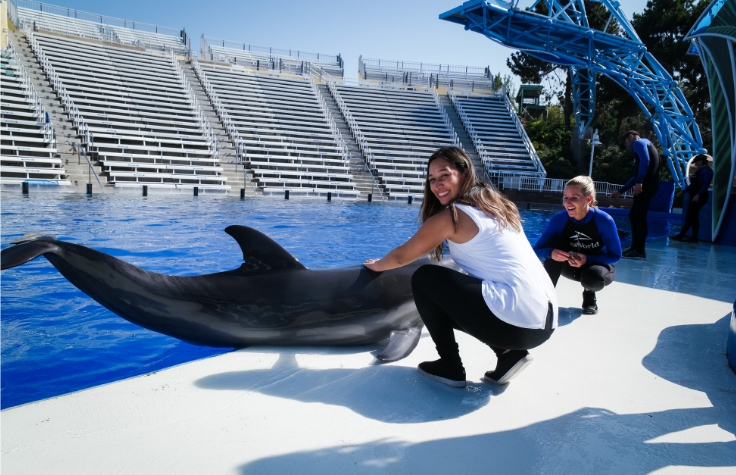
7 March 2019
I am a scientist at Illumina, and I get to do amazing things. Last year, I was on a team that produced the first Atlantic bottlenose dolphin DNA sequence, findings that could support conservation. I love my work, but getting here wasn’t easy, and I couldn’t have done it alone. I needed my many families to help me through.
I was raised in City Heights, in central San Diego, and am the oldest of five children. My parents were teens when they had me. They aren’t well-educated, but wanted their kids to have a better life. My mom, in particular, always encouraged me to do well in school and be an example for my brother and sisters.
Growing up in City Heights is like living in a little bubble. I didn’t see many people with professional jobs or even understand what college was about. Though my mom was incredibly supportive, she didn’t really have the experience to help me down that path.
Things changed when an organization called Aquatic Adventures (now Ocean Discovery Institute) came to my school. They shared their mission to help people like me succeed, and it instantly resonated. I’d always loved the water and the idea of learning to snorkel, and exploring the ocean firsthand — I was in.
It would be underselling it to say Ocean Discovery Institute changed my life. I don’t know where I’d be without them. I was given the opportunity to conduct research in Mexico and, for the first time, I knew I was going to college.
I was accepted at UC Santa Cruz, but unfortunately it fell through. I was devastated, but didn’t give up. I went to plan B, City College. It took a while to get my feet back under me, but I eventually thrived at school, got my first lab job at Illumina, and was accepted to San Diego State University.
Around that time, I got married and had a baby (my little scientist). It made for a challenging first year at SDSU, but I made it, and I graduate in May.
Leaving the City Heights bubble has been a culture shock. Throughout my community, in high school, and even at City College, there were lots of people who looked like me.
But glancing around the science classes at SDSU and the labs at Illumina, I had to ask: Where are the Latinas? They should be here with me, sharing these great experiences.
And I realized, they’re waiting in City Heights, or some other neighborhood, for someone like me to tell them that college and science are paths they can take.
Ocean Discovery opened its Living Lab in City Heights, and asked alums to come home and empower the kids. I share my story and tell them about all the free resources, like the San Diego Festival of Science & Engineering, that can help them learn and grow.
I get to be a mentor and show these young women what I do in the lab and answer their questions. I get to share the chills I felt when I saw my name on that dolphin research paper. I tell them they can do this. There’s just no valid reason they can’t.
Sometimes people use diversity as a buzzword and nobody is sure what it means. To me, it’s like having a billion dollars in the bank. We could leave it there, where it’s less productive, or we could pull it out and do a lot of good in the world.
When we have better representation in science, it’s like opening up that bank account. The kids I meet in City Heights and elsewhere, they’re smart and driven, have unique life experiences and bring a lot to the table. They belong in labs and C suites and boardrooms.
We need to do more as a society to make sure these kids get that message. It never occurred to me I could go to college until somebody told me I should. That’s why Ocean Discovery and the San Diego Festival of Science & Engineering and similar organizations in our local community are so important — they are like extended families that show kids how big their worlds can be.
Source: The San Diego Union-Tribune


